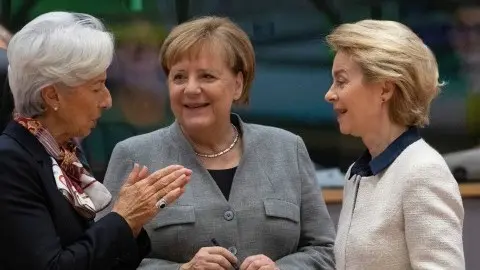Portugal: Economy to slow but the fiscal picture should improve
The Portuguese economy continued to slow in 2019 and we don't really expect things to change much in 2020. Even though the country has a minority government yet again, we don't expect serious political problems ahead. However, expect the fiscal picture to improve
Economic growth slowed further in 2019, but the country still remains one of the better performers within the eurozone.
The slowdown is mainly due to weaker private and government consumption and investment growth. Even though these components are less dynamic, they remain the main growth drivers. Export growth remained decent over the course of the year, but at a lower level than in 2018. Import growth, on the other hand, continued to grow at a much faster pace. This implied that the net trade contribution was strongly negative in 2019.
Consumption and export growth eased in 2019
Year-on-year growth

Looking ahead, we expect the economy to slow further in 2020.
We see two main reasons for this. First, we think that consumption growth will ease further. The unemployment rate stopped edging downwards since the end of 2018 and since then hovers around 6.6%. Consumption was, therefore, less supported in 2019. As overall hiring intentions didn't move much higher in recent months, we don't expect the unemployment rate to come down significantly soon. Second, investment growth is also bound to decelerate. It already slowed in 2019, but still remains at a high level. Moreover, capacity utilisation in the industry started to decline over the course of 2019, leading to less requirement for new investment.
The new minority government, led by the socialist António Costa, is expected to continue with prudent fiscal policy and so the high level of government debt as a percentage of GDP is expected to fall further in the years ahead.
During the election campaign before the October elections, Costa said that Portugal needs to stay on the path of fiscal consolidation in order to be stronger for potential storms ahead. As we expect the interest rate on Portuguese government debt will hover around current low levels in 2020, doing so will be easier.
We expect economic activity to slow to 1.4% GDP growth in 2020 and 2021, compared to 1.9% in 2019. The fiscal picture is expected to improve further.
The Portuguese economy in a nutshell (%YoY)
This publication has been prepared by ING solely for information purposes irrespective of a particular user's means, financial situation or investment objectives. The information does not constitute investment recommendation, and nor is it investment, legal or tax advice or an offer or solicitation to purchase or sell any financial instrument. Read more
Download
Download article
16 December 2019
ING’s Eurozone Quarterly: Is this recovery for real? This bundle contains 13 Articles